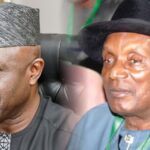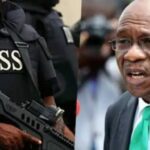By Felix Khanoba
The United Nations Children’s Fund (UNICEF) has expressed concern over the 63 per cent of Nigerians facing deprivation and other forms of poverty in the country.
Speaking at the opening ceremony of a two-day policy and programmatic dialogue workshop on Nigeria’s poverty profile and social register on Tuesday in Abuja, UNICEF Nigeria Representative, Cristian Munduate, said she had personally witnessed the menace of poverty across the country and its accompanying toll in several aspects of people’s lives, including in the area of education.
“From Lagos to Sokoto, I have met individual like Tutu, a struggling single mother, and Umar, a child deprived of education, who personify the reality of our poverty statistics.
” As of 2022, 63 per cent of our population faces deprivation, a disturbing figure that includes 70 million children,” she said.
She, however, applauded various efforts put in place by government and development partners in combating poverty and vulnerability.
Munduate said the workshop provided an avenue to brainstorm on poverty and vulnerability situation in the country in order to chart possible solutions, adding that it was also aimed at expanding Nigeria’s social register and establish a robust, inclusive, and responsive social protection system.
“Our goal is a Nigeria where all citizens, particularly women, children, and the disabled, have access to strong social protections and are not living on the edge of poverty.
“Amid global challenges such as oil price fluctuations, insecurity, socio-economic disparities, and pandemics like COVID-19, poverty is further gripping our people, indicating a dire need for effective social protection interventions. This meeting, hence, symbolizes hope for a future where every Nigerian feels recognized and safeguarded.
“The essentiality of a comprehensive register to reach those most in need can’t be overstated. I’m grateful to the Social Protection Development Partners Group, our unwavering government, and NASSCO for strengthening the National Social Register, a significant step towards our goal,” she said.
Also speaking, the Secretary to the Government of the Federation, Senator George Akume said poverty and vulnerability remain pressing challenges facing Nigeria.
Akume who was represented by the Permanent Secretary, Political and Economic Affairs, office of the Secretary to Government of the Federation, Esuabana Nko-Asanye, said it was crucial to recognise the impact of the issues of poverty and vulnerability on Nigerians citizens.
“Poverty and vulnerability remain pressing challenges in our country, and as we gather here today, it is crucial to recognize the impact of these issues on our fellow citizens. Despite progress in reducing poverty rates in recent years, the COVID-19 pandemic has presented us with new challenges, pushing approximately 63per cent of our population into multi-dimensional poverty of which almost 70 million are children.
” This setback emphasizes the urgency to strengthen our efforts in mitigating these issues and improving the lives of millions of Nigerians,” the SGF said.
Speaking further, Akume said Nigeria’s social inequalities has further exacerbated the situation, as access to essential resources such as food, education, healthcare, and infrastructure are unevenly distributed.
“Women, children, and persons with disabilities are among the most vulnerable groups facing poverty, ill- health, and economic shocks,” he said.
Akume lavished praise on UNICEF and all other partners for supporting the organization of this dialogue, adding that its outcome will have a positive impact on the country.
The AUTHORITY reports that the workshop also attracted
other Social Protection Development Partners including Save the Children, Ministry of Finance, European Union, among others.



